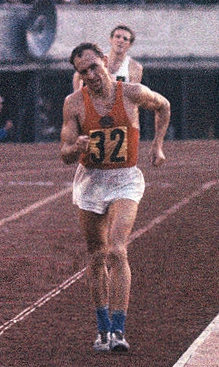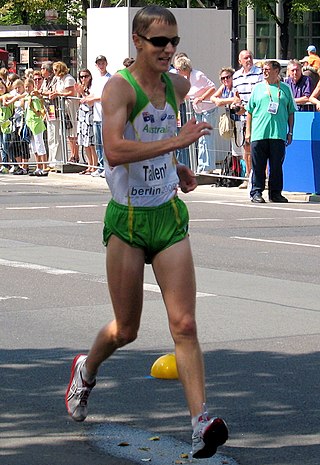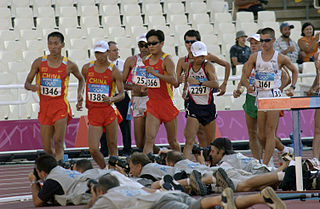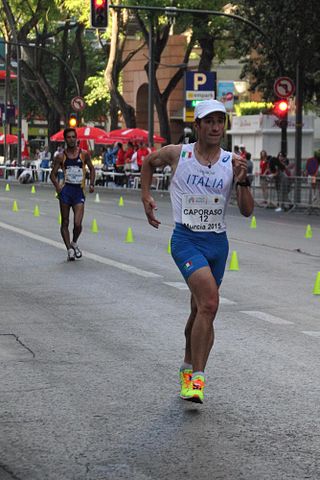The World Athletics Championships are a biennial athletics competition organized by World Athletics. Alongside the Olympic Games, they represent the highest level championships of senior international outdoor athletics competition for track and field athletics globally, including marathon running and race walking. Separate World Championships are held by World Athletics for certain other outdoor events, including cross-country running and half-marathon, as well as indoor and age-group championships.

Volodymyr Stepanovych Holubnychy was a Soviet and Ukrainian race walker, who competed for the Soviet Union. He dominated the 20 kilometre race walk in the 1960s and 1970s, winning four Olympic medals from 1960 to 1972 and finishing seventh in 1976. He became Olympic champion in 1960 and 1968. He is regarded as one of the greatest race walkers of all time and competed at the Olympics on five occasions in 1960, 1964, 1968, 1972 and 1976.
The World Athletics Race Walking Team Championships is a racewalking event organised by World Athletics. It has been held since 1961, and generally on a biennial basis. The first women's edition of the event happened in 1979. It was formerly known as the Lugano Cup after the city that hosted the first event, then became the IAAF World Race Walking Cup until 2016 and then IAAF World Race Walking Team Championships until 2018. In 2004, a junior division was added for athletes between 16 and 20. Since 2008 it has been a constituent meeting of the World Athletics Challenge – Race Walking.

Jorge "Jordi" Llopart Ribas was a Spanish race walker.

Matej Tóth is a Slovak race walker. He is a former Olympic champion in the 50 km walk.

Marco De Luca is an Italian race walker. His best results at International level are 7th place at 2009 World Championships and 6th at 2006 European Championships and 2010 European Championships.

Yohann Diniz is a French race walker. He is the current world-record holder for the 50 km race, with a time of 3:32:33, and for the 50,000 metres track walk, with a time of 3:35:27.

The men's marathon at the 1984 Summer Olympics in Los Angeles, California, was held on Sunday August 12, 1984. The race started at 5:00 pm local time. There were 107 competitors from 59 countries. The maximum number of athletes per nation had been set at 3 since the 1930 Olympic Congress. A total number of 78 athletes completed the race.

Jared Tallent is an Australian race walker and Olympic gold medallist in the 50 km walk from London in 2012. He is a four-time Olympic medallist, three-time World Championship medallist and holds the current Olympic record in the 50 km walk.
Reima Untamo Salonen is a retired race walker from Finland, known for winning the gold medal in the men's 50 km Walk event at the 1982 European Championships in Athens, Greece. A former world record holder, he represented his native country in three Summer Olympics.
The Men's 50 km Race Walk at the 1984 Summer Olympics in Los Angeles, California had an entry list of 31 competitors. Five athletes were disqualified, while nine walkers did not finish the race, held on August 11, 1984.
The Men's 20 km Race Walk at the 1980 Summer Olympics in Moscow, USSR had an entry list of 34 competitors. Seven athletes were disqualified and two did not finish in the final, which was held on Thursday, 24 July 1980.

The men's marathon at the 1980 Summer Olympics in Moscow, USSR had an entry list of 76 competitors, with 74 athletes from 40 nations starting and 53 runners finishing the race held on Friday 1 August 1980. The maximum number of athletes per nation had been set at three since the 1930 Olympic Congress. The event was won by Waldemar Cierpinski of East Germany, the second man to successfully defend Olympic gold in the marathon. Both the Netherlands and the Soviet Union won their first men's Olympic marathon medals. The winning margin was 17 seconds.
The men's 400 metres was an event at the 1980 Summer Olympics in Moscow. The competition was held from July 27 to July 30, 1980. Fifty athletes from 32 nations competed. The maximum number of athletes per nation had been set at 3 since the 1930 Olympic Congress. The event was won by 0.24 seconds by Viktor Markin of the Soviet Union, the nation's first title in the men's 400 metres and first medal in the event since 1956. With the United States boycotting the Games, the country was not represented on the podium for the first time since 1920. Australia earned its first medal in the event with Rick Mitchell's silver, while East Germany won its first medal with Frank Schaffer's bronze, which was the first medal by any German since the United Team took silvers in 1956 and 1960.

The men's 1,500m metres was an event at the 1980 Summer Olympics in Moscow, Soviet Union. The final was held on Friday 1 August 1980. Forty athletes from 29 nations competed. The maximum number of athletes per nation had been set at 3 since the 1930 Olympic Congress. The event was won by 0.4 seconds by Sebastian Coe of Great Britain, the nation's first championship in the event since back-to-back wins surrounding World War I in 1912 and 1920, and first medal of any color since 1932. East Germany took its first medal in the 1500 metres since starting to compete separately, with Jürgen Straub's silver.
Máté Helebrandt is a Hungarian racewalker. He competed in the 20 km walk at the 2012 Summer Olympics, where he placed 32nd, and the 2016 Olympics where he came 28th in the same event.

Race walking events at the Summer Olympics have been contested over a variety of distances at the multi-sport event. There were three race walking events in the 2020 Summer Olympics: a men's and a women's 20 kilometres walk, and a men's 50 kilometres walk. The races were held in a final-only format.
Anatoliy Vasilyevich Solomin is a former Soviet Ukrainian race walker. Solomin competed in men's 20 km walk at the 1980 Summer Olympics and contended for the gold medal, but was disqualified from the lead shortly before the finish. He was European indoor champion in men's 5000 m walk in 1983 and briefly held the 20 km world best. He was born in Komarovka in Penza Oblast.
Yevgeniy Lyungin is a former Soviet racewalker who competed in the 50 kilometres race walk distance. He became his country's first winner of the event at the IAAF World Race Walking Cup in 1975.

Teodorico Caporaso is a male Italian racewalker who won four international medals at senior level at the race walk competitions. He competed at the 2020 Summer Olympics in 50 km walk.










